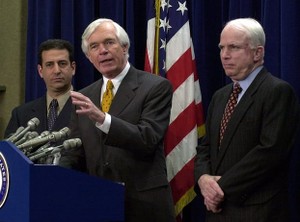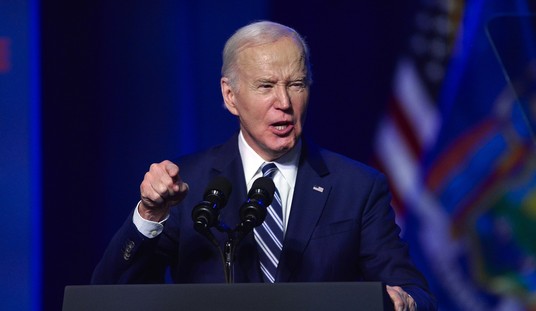A lot of establishment campaign hands and consultants have been somewhat smug of late about their belief that they have beaten back the TEA Party challenge. So far this primary season, they lost a battle for an open seat in Nebraska (although they promptly pretended to have been in favor of Ben Sasse all along) and suffered a stunning defeat when Eric Cantor lost, but they’ve thus far avoided a bloodletting like they suffered in 2010 and 2012 when long time Senate incumbents like Richard Lugar and Bob Bennett went down to ignominious defeat.
But look, really, at what the establishment has actually accomplished and what it took to get them there. Congressional incumbency is supposed to be ~ 90% effective at retaining a seat just all by itself. And the 10% that lose their seats tend overwhelmingly to be due to tidal shifts in swing districts and/or career ending scandal. A scandal-free loss in a primary is supposed to not happen, ever. The Democrat grassroots has mounted a similar sustained effort for the better part of a decade, and the only thing they have successfully managed to accomplish was to force Joe Lieberman to win as an independent rather than a Democrat (which worked out great for them).
And this year, the “victories” achieved so far are so embarrassing that they barely worth mentioning. Thad Cochran lost his first primary before barely scraping out a win in the runoff. Mitch McConnell barely topped 60%, which was the weakest primary showing by a Kentucky Senator of either party since 1938. Lindsay Graham didn’t even reach 60%. This despite the fact that these candidates in question had all the best and most experienced consultants, as well as more personal campaign experience and immensely larger warchests than their opponents.
More importantly, the central complaint by the establishment against the TEA Party candidates is thus far correct: for the most part, they aren’t very good candidates. They do tend towards gaffes, they do have problems raising money, they do tend to be surrounded by inexperienced staff who aren’t up to the task of running statewide, and they are usually measurably more likely to lose in the general election. And yet – and yet. Even given all this, establishment candidates are barely squeaking out wins. When the TEA Party runs a candidate with even marginal skill, the establishment candidate tends to go down in flames.
Really, it’s not all that much unlike USA Basketball back when we first started allowing the pros to play in the olympics in 1992. The first iteration of the “Dream Team” obliterated everyone they played, beating most teams by over 40 points and never letting any get closer than 20 at the end en route to an easy gold medal. Subsequent iterations started showing the rot that existed in USA Basketball by winning by smaller and smaller margins until it became clear that there was a serious problem when we couldn’t defeat the oily Greek ponytails and only then was the entire program overhauled.
Writing in the Weekly Standard, Jay Cost explains that now more than ever, the GOP is in trouble with the voters that make up the core of its base:
In politics, of course, a win is a win is a win. Even so, Cochran supporters inside and outside Mississippi should be asking themselves: is it really a sustainable strategy over the long haul to rely on Democratic votes in a GOP primary? Of course it isn’t. The party elite had better take a close look at that 47-49 percent of the party electorate that voted against Cochran at least once, figure out what has them so riled up, and then do something about it. Otherwise, sooner or later, they will be bounced from power as candidates with more polish than McDaniel emerge to challenge them. Imagine if Marco Rubio had been from Mississippi; he would have routed Cochran this week.
Too often, Republican establishment types seem to have an exactly backward assumption about their place in politics. They seem to think that their core voters are the problem – that if only they would sit down and shut up, the leadership could steer the party to victory in November. Wrong. In fact, the establishment’s primary season struggle is a leading indicator of its general election weaknesses. Sure, primary voters are more conservative than general election voters, but both perceive the same malady, which is not reducible to a left-right distinction: the Republican party says one thing to get elected, then does another once elected. It pledges on the campaign trail to reduce the scope of government, but in Washington, D.C. it perpetuates the Leviathan, often in support of well-heeled interest groups.
Barone is correct and I don’t think he even gives enough credence to the extent to which GOP primary voter anger simmers after these defeats. For three straight elections now, conservatives have been willing to live by the mantra of conservative in the primary, Republican in the general. But with Mitch McConnell at the wheel during this election cycle, the tactics used by McConnell and Cochran to secure their costly victories, especially after watching the Lisa Murkowski/Arlen Specter/Charlie Crist party switching show, have gotten many voters to seriously consider voting Democrat in the general to root the corruption out of the GOP once and for all.














Join the conversation as a VIP Member